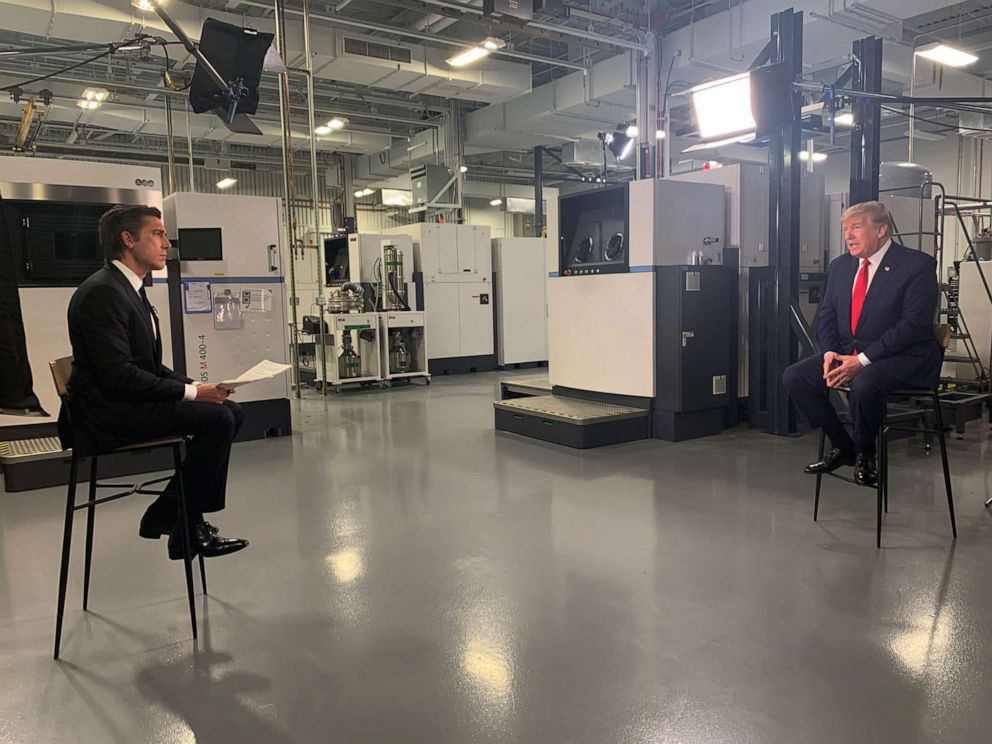President Trump to Americans who've lost loved ones to the coronavirus: 'I love you'
His comments came in an exclusive interview with ABC's David Muir.
President Donald Trump, criticized for an apparent lack of empathy during the crisis, has a new message for Americans who have lost a loved one to the coronavirus that has killed more than 70,000 people in the United States: "I love you."
"We've lost more people now than we lost in the Vietnam War. What do you want to say to those families tonight?" ABC News' "World News Tonight" anchor David Muir asked in an exclusive interview with the president Tuesday in Phoenix, Arizona.
"I want to say, ‘I love you.' I want to say that we're doing everything we can," Trump told Muir.

The president said the government was taking extra measures to protect people over 60.
"It's a vicious, vicious virus," Trump said. "But I want to just say to the people that have lost family and have lost loved ones, and the people that have just suffered so badly, and just made it -- and just made it -- that we love you.
"We're with you," he continued. "We're working with you. We're supplying vast amounts of money, like never before. We want that money to get to the people. and we want ‘em to get better."
Trump indicated steps he has taken to try to shore up the U.S. economy should comfort Americans whose relatives have died.
"You can never really come close to replacing, when you've lost some--" Trump said. "No matter how well we do next year, I think our economy is going to be raging. It's going to be so good. No matter how well, those people can never ever replace somebody they love. But we're going to have something that they're going to be very proud of."
Tune into ABC at 1 p.m. ET and ABC News Live at 4 p.m. ET every weekday for special coverage of the novel coronavirus with the full ABC News team, including the latest news, context and analysis.
He said no one has taken the deaths "harder" than him.
"To the people that have lost someone, there's nobody -- I don't sleep at night thinking about it," Trump said. "There's nobody that's taken it harder than me. But at the same time I have to get this enemy defeated."
Since the start of the COVID-19 outbreak, Trump has generally eschewed excessive expressions of empathy or the outreach to victims typical of American presidents during times of crisis. His first major trip in nearly two months took him not to a hospital or other medical facility, but to a factory in Phoenix churning out protective masks.
Late last month, an analysis by The Washington Post found that, over 13 hours' worth of briefings in three weeks, he had spent just 4 1/2 minutes expressing condolences for victims.
In the days that followed, Trump read from prepared remarks at the start of his public appearances, briefly noting the toll the virus has taken on victims.
And as the U.S. death toll from the pandemic surpassed that of the Vietnam War last week, Trump said he had only spoken to just a handful of families who had lost loved ones.
"I have many people. I know many stories," Trump said in response to a question from ABC News on April 28. "I have spoken to three, maybe I guess four families unrelated to me. I did. I lost a very good friend. I also lost three other friends, two of whom I didn't know as well, but they were friends and people I did business with."
Trump did not share details of those with whom he said he spoke, describe any of their stories or say if speaking to them impacted him. Instead, he quickly pivoted to discussing how he would like schools to reopen.
A White House spokesperson said that by "unrelated," the president meant not just relatives but also "people he has a connection to."
Trump has in the past spoken of a friend in New York who passed away due to coronavirus, real estate developer Stanley Chera. "It hit him very hard," the president said last month.
This report was featured in the Wednesday, May 6, 2020, episode of “Start Here,” ABC News’ daily news podcast.
"Start Here" offers a straightforward look at the day's top stories in 20 minutes. Listen for free every weekday on Apple Podcasts, Google Podcasts, Spotify, the ABC News app or wherever you get your podcasts.
What to know about coronavirus:
- How it started and how to protect yourself: coronavirus explained
- What to do if you have symptoms: coronavirus symptoms
- Tracking the spread in the US and Worldwide: coronavirus map




